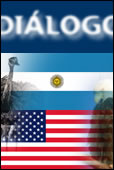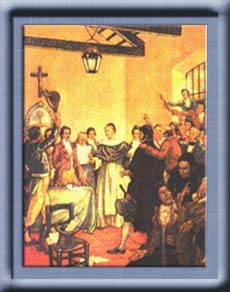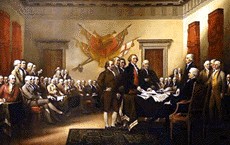"Separation of Powers and Defense of the Intellectual Property"
The 19 and 21 of November, the Dialogue organized several activities chaired by the Honorable Judge Margaret McKeown.
Named by the National Law Journal as one of “the 50 Most Influential Women Lawyers” in the United States, Judge McKeown specialize in complex litigation, intellectual property, antitrust, international law and trade regulation.
...| See more
"Civil Military Relations in a Democracy"
The 9 of August, the Dialogue organized a luch chaired by Major General Richard B. Goetze, Jr., USAF (Ret.).
Dr Richard B. Goetze served as the Vice Director of the Joint Chiefs of Staff, President of the College of Aeronautics in New York City and now is the Deputy Program Manager for Latin America of the Center for Civil–Military Relations (CCMR) in Monterrey, California.
His military decorations and awards include the Distinguished Service Medal, Defense Superior Service Medal, Legion of Merit with oak leaf cluster, Distinguished Flying Cross, Meritorious Service Medal, Air Medal with 13 oak leaf clusters, and Air Force Commendation Medal.
...| See more
"Legal aspects of doing business in USA and Argentina, the importance of the Labor and Migratory Law"
Between the 11 and the 14 of June, the Foundation carried out a series of important activities with Dr Salomon Chiquiar-Rabinovich.
Dr Chiquiar-Rabinovich is the President of the New England-Latin America Business Council. NELABC's mission is to promote and facilitate the development of business, inter-regional trade and investment opportunities between New England and Latin America.
He is also associate lawyer in the Boston office of Seyfarth Shaw LLP, one of the most important firms in labor and migratory issues of the United States. They have more than 700 lawyers specialized in those thematics, nine offices in the USA (Chicago, New York, Boston, Washington D.C., Atlanta, Houston, Los Angeles, San Francisco and Sacramento); and one in Brussels, Belgium.
Finnally, Salomon is the Deputy President of the Hispanic National Bar Association (Region I- New England).
Previously, and between several outstanding positions, he was Assistant Secretary of State of Puerto Rico, in charge of the Bureau of International Exchange and Technical Cooperation.
...| See more
"The Importance of the Social Corporate Responsibility"
The Thursday 29 of March the Dialogue carried out a debate table led by Dr. Phil Rudolph.
Dr. Rudolph is the vice-president of the Ethical Leadership Group in St. Charles, Illinois, and previously he was vice-president of McDonalds (where he helped to create the first report of SCR of the company).
...| See more
"International Trade in the XXI Century"
The 19 of March the Dialogue organized an activity led by the Dr Richard Feinberg. On the following day, a similar meeting took place in the CARI (Argentine Council for International Relations).
Feinberg is director of the Asia Pacific Economic Cooperation (APEC) Study Center, and co-director of the Leadership Council on Inter-American Summitry. Feinberg served as special assistant to President Clinton for National Security Affairs and senior director of the National Security Council's (NSC) Office of Inter-American Affairs. He previously served as president of the Inter-American Dialogue, executive vice president of the Overseas Development Council, and has held positions on the policy planning staff of the U.S. Department of State and in the Office of International Affairs in the U.S. Treasury Department.
...| See more
"The value of strong institutions in a Democracy"
Our Fundation prepared for the Tuesday 13 of March a round table to speak about institutions and Democracy.
The encounter was developed in the American Club and was chair by the Professor Strom C. Thacker, Director of Latin American Studies Program and Associate Professor of International Relations of the Boston University.
...| See more
For a correct visualization of the Web site, we recommends a resolution of screen of 800x600 pixels and a size of text "Medium".
|
 Ambassador Wayne delivers an speech during the "Day of the Independences".
Accede to the complete list of activities made by the Dialogue.
|
|
 |
 |
| |
| |
 |
Lunch for the "Day of Independences"
With the objective of commemorate the independences of the Argentine Republic (9 of July) and of the United States of America (4 of July), a lunch was carried out last Thursday 5 of July, at 12 AM.
It was developed in the American Club and coorganized by our Foundation, The American Society of the River Plate, The American Women's Club and the American Club of Buenos Aires.
The Ambassador of the United States, Mr. Earl Anthony Wayne, jointly with his wife and distinguished members of his Diplomatic Mission, honored us with their presence.
| Bush Delivers State of Union Address 2008
The U.S. Constitution requires that the president report to Congress "from time to time" on the "State of the Union." This constitutional requirement has evolved into the president's annual State of the Union address, which now serves several purposes. The speech reports on the condition of the United States both domestically and internationally, recommends a legislative agenda for the coming year and gives the president the opportunity to convey personally his vision for the nation.
...|See more
|
 |
NATIONAL AND INTERNATIONAL POLITICS
 The Argentine American Dialogue is developing a series of meetings destined to analyze different aspects of the national and international reality. The Argentine American Dialogue is developing a series of meetings destined to analyze different aspects of the national and international reality.
In the first two encounter we counted with the exposition of the journalist Nelson Castro and the vice-president candidate Jorge Asís.
|
|
|
 |
Synthesis of Argentine and American history

Tucumán Congress
Congress that reunited the representatives of the United Provinces of the Silver River in the present Argentine city of San Miguel de Tucumán. In the session of the 9 of July of 1816, presided by Francisco N. Laprida, it declared independence from the Spanish colonial power ("and from all other foreign domination").
...|See more
|

Signature of the Declaration of Independence.
The 2 of July of 1776, the Congress voted the national independence and the 4 of July approved the Declaration of Independence. Also it ordered to George Washington the recruitment of an army, approved the emission of paper money and created local governments.
...|See more
|
|
Follow the actuallity of the economies and the value of the currencies.
|
|
|
|
 |
| |
|
 |
 |
|
|

